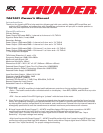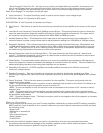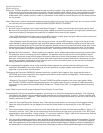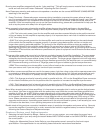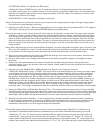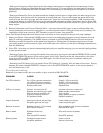Running two amplifiers strapped will require “gain matching.” This will require source material that includes test
tones and volt ohm/multi meter. Please see “Adjusting the Gain Controls”
Note: Please pay attention and make sure the speakers or woofers are the correct IMPEDANCE (OHMS) BEFORE
attaching to the amplifier.
3. Power Terminals – Please take proper measures during installation to protect the power wires as best you
can. For example, when running the power cable from the vehicle’s battery through the firewall, use a firewall
bushing for protection. Run the power wire through the interior of the vehicle, under the carpet, and to the
amplifier. If this is something that you do not feel comfortable doing, please ask a professional to help you. Be
sure to lay the power wire away from all signal cables.
When connecting the power wires to the amplifier please observe the printed markings on the amplifier’s
StreetWires power connector. Failing to wire the power cables properly could result in amplifier damage.
• +12V: This is the main power input for the amplifier and must be connected directly to the positive terminal
of the car battery for the amplifier to operate properly. It is important that a main fuse is installed a maximum
of 18” from the battery.
• GND: This is the ground connection for the amplifier and must be connected directly to the metal chassis
of the vehicle for the amplifier to operate properly. A properly grounded amplifier can be run harder and
longer than a poorly grounded amplifier. The ground on the amplifier should be as short as possible and
be connected directly to the vehicle’s metal chassis. Do not connect to factory bolts of ANY kind. When
attaching the ground to the chassis, sand all the paint away from the contact point. A grounding block like the
StreetWires GT4 should be used whenever possible as this piece of equipment has 5 times the surface area of
a normal screw.
The gauge of the power and ground wire is often an overlooked aspect of amplifier installation. The more power
the amplifier receives, the more power it will produce. Power cables have a natural resistance, and will lose
voltage by the time the power makes its way to the amplifier. The larger gauge (diameter) wire will hold more
voltage over longer runs. Also, by having a larger diameter ground wire, the amplifier can run more efficiently.
MTX recommends using a minimum of 1/0 gauge power and ground cables to get the best performance.
• REM: This connection turns the amplifier on and off and needs to be connected to a remote turn-on wire
from your source unit if you are using a low level input connection.
Note: When numerous amplifiers are used in the same system, look into using a relay with a separate power wire
connected to an alternative power source to take the strain off the source unit. Normal source units can only
keep a constant 12 volts to 2 or possibly 3 amps. This wire should also be run away from the RCA cables.
• CAP+: This 8 gauge terminal is internally wired in parallel with the +12V on the StreetWires Power connector.
It is the ideal connection point for the positive side of a capacitor to increase the amplifier’s performance.
• CAP-: This 8 gauge terminal is internally wired in parallel with the GND on the StreetWires Power connector.
It is the ideal connection point for the negative side of the capacitor to increase the amplifier’s performance.
Note: When strapping two of these amplifiers, it is important to remember that in order to get the desired power
out of them, you have to supply them with the power they need. With the current draw these amplifiers are
capable of pulling, we at MTX highly suggest upgrading to a high output alternator rated at 300 amps- or a
dual alternator set up. At the same time, you must upgrade the stock battery and add a couple more batteries
to the system. We recommend a minimum of three batteries with a cold cranking amp (CCA) rating of 725 or
more. Please remember to install a minimum of 1/0 AWG power and ground cable for the electrical system
upgrades and the amps. Just adding extra batteries will not solve the need for power; it will actually put more
of a load on the alternator, in turn yielding less power to the audio system.
Double check all the previous connection installation steps, in particular the speaker and power wiring. Securely
mount the amplifier. If everything is in order, reconnect the vehicle’s negative battery connection and begin
following the Feature Setup and Adjustments steps.
Feature Setup and Adjustments
1. Selecting the Input Sensitivity Range – Before you turn on your system, you must select the proper input
sensitivity range on your amp using the button labeled INPUT SENS located in the GAIN CONTROL section of
the control panel.
• Setting for Aftermarket Source Units: Refer to your aftermarket owner’s manual for line level output
specification. If the specification is not available, please follow the instructions listed below.



